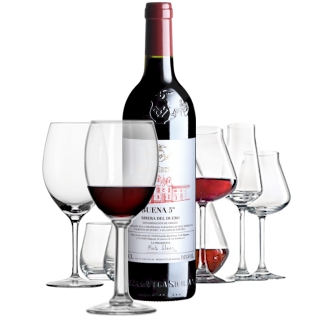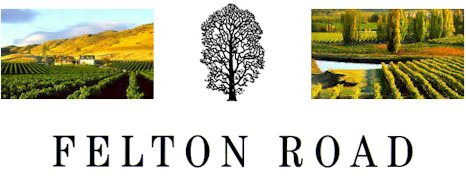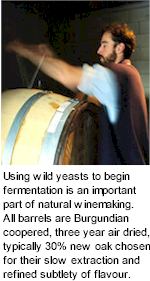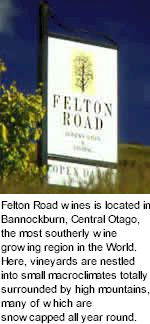


Here, vineyards are nestled into small macroclimates totally surrounded by high mountains, many of which are snowcapped all year round. Though the location is on the edge of sustainable viticulture these macroclimates consistently combine hot days, cool nights and long dry autumns, perfect for the creation of fine Pinot Noir, Chardonnay and Riesling. The latitude of 45 degrees south is similar to the Willamette Valley in Oregon and some of the finest wine regions of France.

Central Otago is New Zealand's only wine region with a continental climate rather than a maritime one. This brings the risk of frosts but has the benefit of low rainfall and high sunshine hours. Of the five distinct macroclimates so far identified in Central Otago, Bannockburn, with its gentle north facing slopes and deep loess soils seems well suited to the production of complex Pinot Noir.
The first vineyard, Elms, was selected by Stewart Elms in 1991 and planted the following year. It is a north-facing gentle valley, one of the few in Bannockburn to escape the attentions of the gold miners who sluiced many of the Bannockburn slopes. Careful attention was given to the matching of vine varieties and rootstocks to the soil variations that are found on the site. Natural gullies have been retained which guide cold frosty air through the vineyard away from the vines.
In addition Felton Road have an eight-hectare vineyard at Cornish Point in Bannockburn, dedicated entirely to Pinot Noir. Here there are 18 different combinations of variety and rootstock, each carefully matched to the soil profiles. The vineyard is designed to allow separate vinification of each section: a veritable laboratory of Pinot Noir and its possibilities. Felton Road also have a long term lease on the neighbouring Calvert Vineyard, which is entirely devoted to Pinot Noir.

Viticulture makes extensive use of handwork and is heavily influenced by organic practice. The canopies use the Vertical Shoot Position trellis system with all pruning, positioning, shoot thinning, leaf plucking and fruit thinning performed carefully by hand. The use of natural manure obtained from organic sources aids our the gentle touch that the Felton Road winamakers apply to their vines. Harvesting is by hand starting around the beginning of April and each block is harvested and vinified separately.
When making Pinot Noir, fruit passes by gravity to fermenters to prevent pumping of must. Fruit is not crushed, so it ferments as whole berries while the use of a percentage of whole bunches adds complexity and structure. Using wild yeasts for fermentation is an important part of natural wine making philosophy, with wines being rested outdoors in small fermenters for extended maceration with up to four punch downs per day, before being run by gravity to barrel. All barrels are Burgundian coopered, 3 year air dried (typically 30% new oak each vintage) and selected for their slow extraction and subtlety of flavour. Natural malo-lactic fermentation follows in the spring with wines being normally bottled after about a year in oak. Racking, fining and filtering of the wine is avoided wherever possible. White wines are all hand harvested and whole bunch pressed. Chardonnay for barrel fermentation passes by gravity straight to the barrel from the press to await a wild yeast ferment. Again a natural malo-lactic follows in the spring.
Chardonnay barrels are also 100% French oak, low extraction, 3 year air dried. This Chardonnay is stirred by batonnage (stirring of the lees) regularly throughout its life. Rieslings and unoaked Chardonnays are whole bunch pressed then wild yeast fermented, with the wines being left on gross lees with stirring to develop complexity and mouthfeel. The philosophy is to let the fruit speak for itself, gentle handling, as little intervention as possible. Wine is given a helping hand to express itself rather than moulded into an artificially created winery style.
